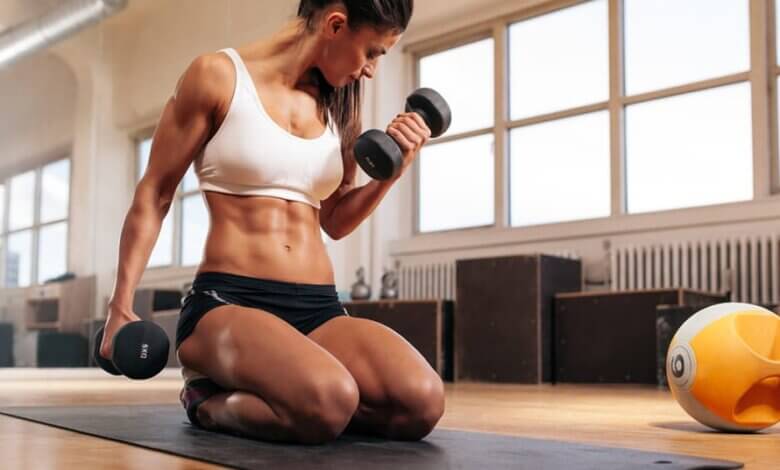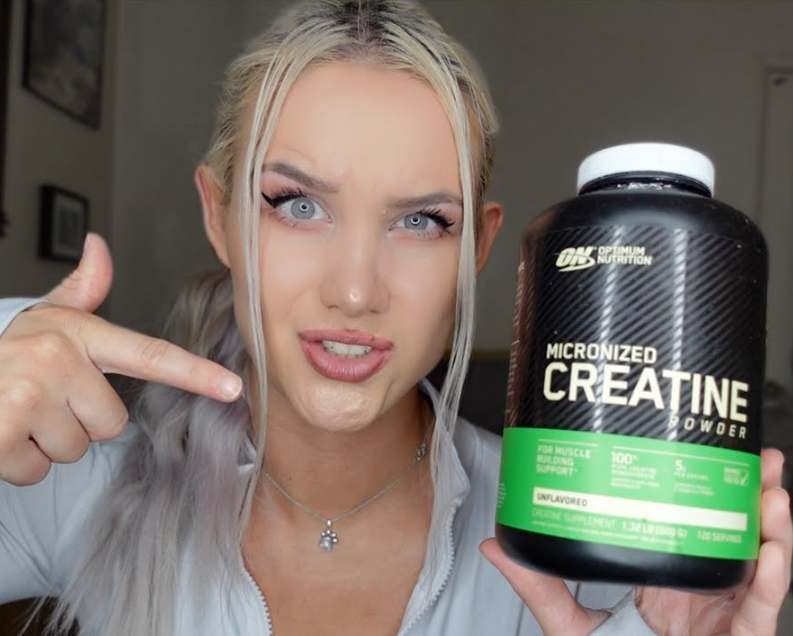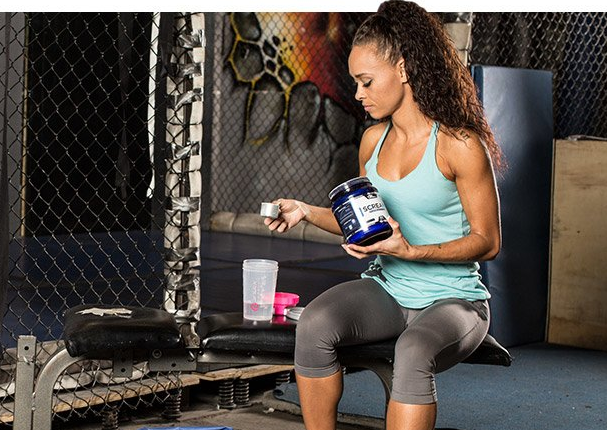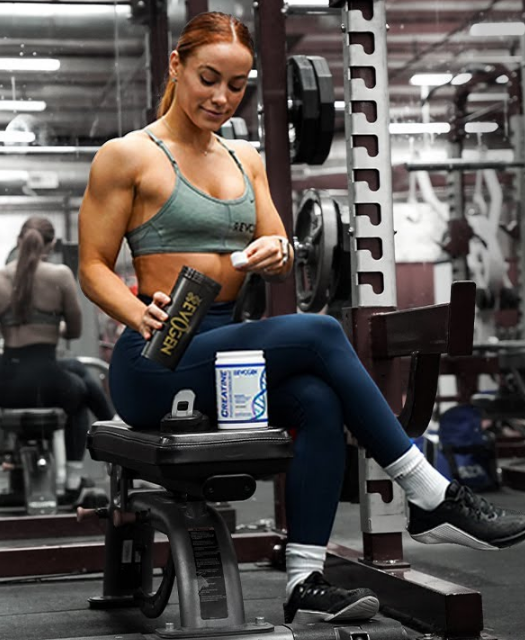Creatine Supplementation for Women – General & Sports Related Benefits, Myths & Tips For Use

Ladies, we all know that creatine is typically associated with bulky, burly men sporting 20” thick biceps and triceps in mainstream media. That’s usually the demographic that supplement manufacturers have always targeted, with advertorials and product labels centered around pro bodybuilders.
If you are a woman, it can almost seem like this is the one supplement that you shouldn’t be using if you are looking to stay lean. In fact, it’s quite the opposite!
Creatine is an amazing supplement for women that can help optimize performance and provide more energy for those explosive training sessions - all while keeping you stronger, fitter, and healthier.
In this article, we’ll shed some light on creatine for women, bust some myths surrounding it, and give a few tips on use so that you can make an informed choice as to whether or not creatine is right for you.
What is Creatine?
Creatine is a molecule produced by our liver, kidneys, pancreas, and brain from the amino acids glycine, arginine, and methionine. It isn't a steroid or hormone and its structure more closely resembles the amino acids that it is made up of (1).
On average, the body produces about 1 gram of creatine a day, which is mostly stored in muscle tissue in the form of creatine phosphate and phosphocreatine. A small amount creatine is also stored in our brain, kidneys, liver, and testes (1).
It is associated with a plethora of biological functions at the cellular level, however its primary function is the creation of adenosine triphosphate (ATP), the main source of energy in our bodies.
Creatine is naturally found in beef, venison, pork, chicken as well as some varieties of fish such as cod, herring, and tuna. Interestingly, it has been discovered that wild varieties of meat have twice the amount of creatine as compared to meat bred in captivity.
The recommended maintenance dose of creatine for athletes is around 0.1 g/kg of body weight. This amount is sufficient to replenishes ATP stores and boost performance during high intensity workout sessions (1).
Creatine is produced in the liver, kidneys, pancreas and brain, with its major physiological function being to provide energy throughout the body. It can be found in many different kinds of meats and as a supplement it should be taken at a dose of 0.1 g/kg of body weight.
How Does Creatine Work?
When eating foods containing creatine, or when when taking a creatine supplement, it is rapidly absorbed and gets converted to creatine phosphate before ultimately being stored in the muscles and organs throughout the body (1) .
During high intensity exercises - a squat, a deadlift, or a sprint, the body needs an explosive burst of energy to initiate a specific movement, which is what creatine efficiently provides.
When a muscle contracts, the phosphocreatine in the muscle gets converted into ATP, the most abundant and most important form of energy in the body. The edge that creatine gives an athlete is simple - it provides the body with greater amounts of ATP available for immediate use and bolsters the body's ATP reserves. This dual mechanism maintains energy levels throughout a workout where intense muscle contractions are required (1).
Creatine isn't always used for energy during exercise and eventually your body switches to fat and sugar to fuel the majority of physical activity. However, most workouts are cyclical where intense muscle contractions are necessary, which is why creatine is so important.
It has been estimated that the first 15-20 seconds of any intense activity will be fueled by creatine. In theory, that might not sound like a lot, but when lifting and running on a treadmill users definitely notice the boost creatine provides.
Imagine being able to increase your 1 RM deadlift by 10-15 lbs. Or being able to improve your 100 meter sprint by 2 or 3 tenths of second? To many, if not all athletes, that is a big difference.
And, that is just the tip of the iceberg. Creatine has a host of other benefits for athletes and non-athletes alike that often overshadowed by its affect on fat-free lean muscle mass that all the gym goers and bodybuilders talk about.
Creatine is rapidly absorbed to provide immediate and sustained energy throughout a workout. It does so by supporting intense muscle contractions during exercise.
Should Women Take Creatine?
The answer to this question depends entirely on an individuals goals. With that said, women athletes, and women in general, have a lot to gain from supplementing with creatine. Creatine is definitely NOT gender specific!


Typically, discussions and research on creatine supplementation have focused on its use in men, however, that is changing. Females have 70-80% less endogenous (made naturally by the body) creatine stores compared to males. So, supplementing with creatine not only makes sense for certain women, but can be very beneficial at any age (2).
Author Perspective - Why I Started Using Creatine
Let me just start off by giving you the 4 main reasons why I started using creatine so that you can decide for yourself.
I started using creatine because it has been proven to help with fatigue and help improve brain performance. These two reasons alone were enough for me to start supplementing with creatine. I saw this as an opportunity to get an edge over my peers during my busy day at work (3).
The other reason is because of the improved exercise performance and muscle growth that creatine has been shown to provide. Again, an edge.
So I decided to get myself some creatine and have been using it ever since. I throw my pre-workout in my motivational water bottle followed by my creatine. Easy Peasy.
You can check out the stuff that I use here.
Creatine Benefits For Women
1) Improves Exercise Performance
Taking creatine can improve exercise performance in several different ways.
First, it must be stated that most studies looking at creatine's effect on training and exercise have been performed in men. However, evidence exists that women can experience the same gains, just to a lesser extent (4).
These benefits include (4):
- Increased exercise capacity
- Better stamina and endurance
- Reduced fatigue
- Improved strength
- Enhanced recovery
- Injury prevention
- Increased recovery from injury
Users should experience benefits irrespective of their current body composition. Even if just starting to exercise after a 10-year hiatus, creatine taking creatine will still be beneficial.

2) Increases Fat-Free Muscle Mass
There's a common misconception that creatine makes you fat. In fact, it is quite the opposite and research has shown that creatine supplementation increases fat-free muscle mass in healthy subjects (5, 6).
How? The exact way that creatine increases fat-free muscle mass is still debated. Studies from the 1970's found it to increase protein synthesis, specifically actin and myosin.
However, more recent studies found that creatine did not increase protein synthesis.
Other mechanisms have been proposed as to how creatine increases fat-free muscle mass including mTOR pathway modulation, altering the myokines (the body's muscle regulators) myostatin and insulin growth factor-1 (IGF-1).
However, the jury is still out and more studies need to be done on the topic (7, 8, 9).
Exactly how creatine increases fat-free muscle mass isn't as important as the real gains it produces. Creatine's ability to improve exercise performance is what ultimately drives the results it generates.
The first effect that users report is slight weight gain and water retention due to the increased intramuscular water that creatine pulls in. However, over time water retention lessens and what remains is permanent muscle tissue that you can retain by working out and eating well.
3) Improved Cognitive Performance
The brain requires a high amount of energy, even in its "resting state". So, it isn't surprising that small amounts of creatine are naturally produced in the brain to provide enough ATP to meet the brains high energy demand.
Research on creatine supplementation has focused primarily on how it affects memory. Study results have been mixed, but more research has found a benefit than no benefit (10).
Supplementing with creatine seems to be more effective at improving cognitive function in sleep deprived subjects, but only when combined with exercise (10).
All in all, more research needs to be done on if creatine improves cognitive performance, but existing studies are promising.
4) Reduced "Resting" Fatigue
As just mentioned, creatine supplementation, when combined with exercise, has been shown to improve cognitive function, ultimately reducing fatigue in sleep deprived individuals (10).
For a busy, working woman, that translates into to having improved energy for everyday activities. Adding regular exercise to a daily regimen can produce even better results.
5) May Improve Glucose/Blood Sugar Regulation
Several human studies have found that creatine supplementation may help regulate the levels of sugar in the blood by increasing the glucose transporter type 4 (GLUT-4), a protein in cell membranes responsible for bringing glucose from the blood into cells to be used for energy (11, 12).
These findings are significant, however more research needs to be done in humans to determine how effective creatine is at controlling sugar levels in the blood.
6) May Slow down bone loss
Most women are prone to bone loss and osteoporosis (brittle bones) as they age. According to a study done in 2020, creatine supplementation may help in slowing down this bone density loss (13).

Creatine supplementation has a host of benefits for men and women. Although women may not experience the same gains as men, they are just as likely to benefit from all that creatine has to offer such as improved exercise performance, increased fat-free muscle mass, and improved cognitive performance. In addition, women may have improved glucose regulation, and slow down bone loss as they age.
Top 5 Women-related creatine myths
Despite the evidence that supports the use of creatine in women, the number of women taking creatine, including female athletes and fitness buffs seems to be surprisingly limited.
Most women tend to shy away from creatine fearing that it might make them look bulky or fat. Here are the top 5 myths surrounding creatine that make women skeptical about using it.
1) Creatine makes you fat
Creatine does not make anyone fat, but it does increase the "water" that your cells hold. However, the water retention is intramuscular, which means that it increases the size of muscles only, and has absolutely no connection with the levels of fat in the body, nor does it affect fat metabolism.
In a 2000 study, female athletes who used creatine not only had increased upper body strength, they also had reduced body fat after just 5 weeks (14).
The only instance where creatine may appear to make someone look "heavier" is if they have high body fat to begin with. If this is of concern, it is recommended to focus on losing the desired amount of fat first prior to taking creatine.
2) Creatine Makes You Look Bloated Or Soft
Creatine does not increase subcutaneous water levels and therefore should not cause bloating. It only draws more intracellular fluid into muscle cells. If bloating does occur, experts suggest checking your electrolyte levels and your salt intake, both, if in excess, can cause water retention. In addition, if preloading creatine, it is suggested switch to a much lower daily maintenance dose.
3) you lose your gains when you stop using creatine
Absolutely not. Gains made are gains kept. The only thing lost after creatine use is discontinued is water retention in the muscle. As long as a regular diet and lifting routine is continued the muscle gained while on creatine should be maintained.
4) creatine is a steroid
Untrue. Its structure is similar to that of amino acids. Creatine does not have any effect on your hormone production, nor does it impact your HPTA. For women, there's no risk of virilization or masculinity, which is a serious side effect of anabolic steroids.
5) creatine is unsafe for women
The International Society of Sports Nutrition, the foremost authority of dietary supplement use and safety, clearly states that no evidence exists that would indicate creatine is unsafe for men or women. Many studies have shown time and time again that long-term creatine supplementation is safe across a wide range of doses and age groups.
The caveat is that most safety related studies have been conducted in men. However, men and women's physiology's are not that fundamentally different aside from hormonal considerations and there is not a known link between different hormones and creatine. So, in conclusion creatine's safety profile for men and women is virtually the same (4).
5 Tips For Creatine Use In Women
1) Avoid Loading Creatine
The creatine loading phase, where high doses in the 10-15 gm/day range for 7 days, is not required for optimal benefits. While there is some logic that users may experience better results when creatine levels are saturated more quickly in your blood, preloading as a dosage protocol is not necessary.
According to researchers, most male bodybuilders excrete about 0.1 gm/kg of the creatine that they ingest when taking high doses. Also, there is enough research to suggest that identical results can be achieved without loading creatine (15).
2) Creatine can be taken before, during, or after exercise
One of the most widely debated topics around creatine is the ideal time to take it. It has been proposed that creatine works best when used pre-workout and that it provides a more pronounced energy boost during your workouts. However, the evidence is lacking to support this claim.
In general it does not matter when you supplement with creatine. It can be taken before, during, or after exercise (16, 17).
3) Creatine in Simple powder form works best
There's no single form of creatine that works better than another. Be it effervescent creatine or chewable gummies, they are all essentially the same.
In fact, liquid forms of creatine can contain creatinine, which is a useless byproduct that's released when creatine is exposed to heat or moisture for a prolonged period of time. That's something that's very possible during the beverage manufacturing process where citric and phosphoric acids are added as preservatives.
Powdered creatine monohydrate is the most bioavailable and stable form of creatine, simple as that. Quality varies from brand to brand, so if interested in using creatine, be sure to perform proper due diligence and read user reviews before committing to a specific brand.
Chinese brands are notorious for containing contaminants like dicyandiamide and sodium, so be sure to buy from reputable brands that offer clean and pure creatine.
4) Creatine does not need to be cycled
To add to what we have already said about creatine's safety profile, there's no need to cycle it off either. It is already produced naturally in your body so you could never truly be able to cycle off anyway.
There are female athletes who have used creatine for up to five years continually without any problems.
5) Creatine can be taken regularly even if you do not workout
While this entire article is focused on the potential benefits of supplementing with creatine for athletes and women who exercise regularly, it is clearly beneficial to use creatine even if you do not work out. It is neuroprotective, prevents bone loss, increases strength, reduces fat and improves lean body mass.
Final Thoughts
Creatine can be extremely beneficial for women of all ages and lifestyles. It has numerous health benefits and is one of the safest and most studied supplements in existence.
If you have any questions, concerns, comments, or suggestions, please leave them below and we will try and address them in a timely manner!


